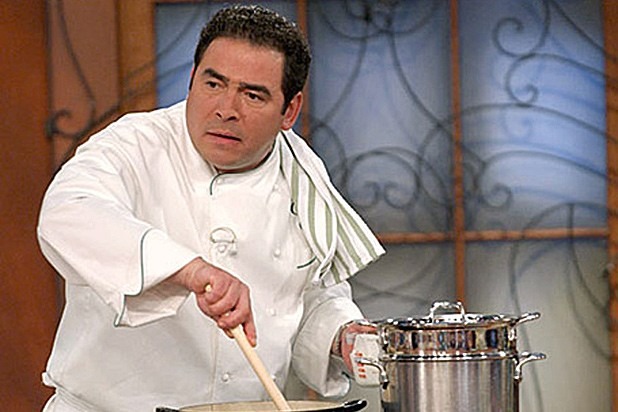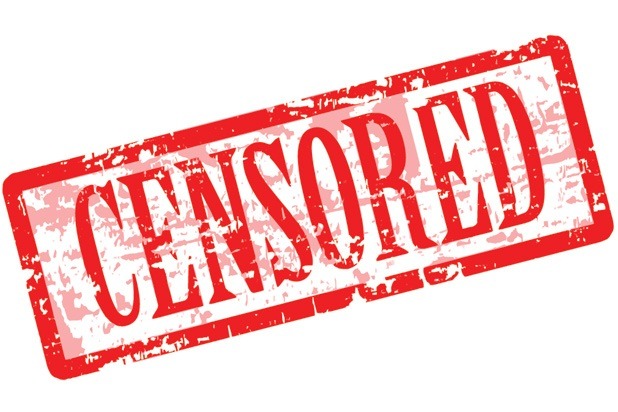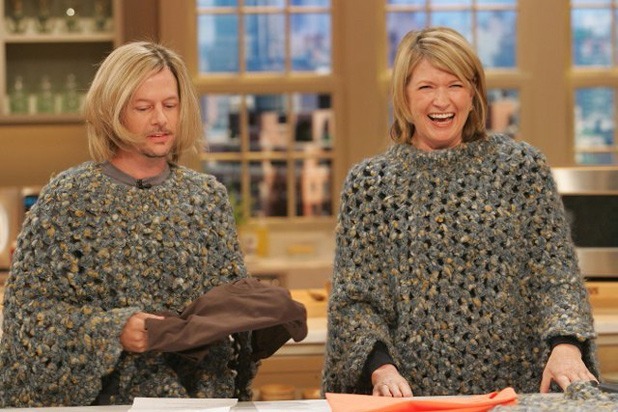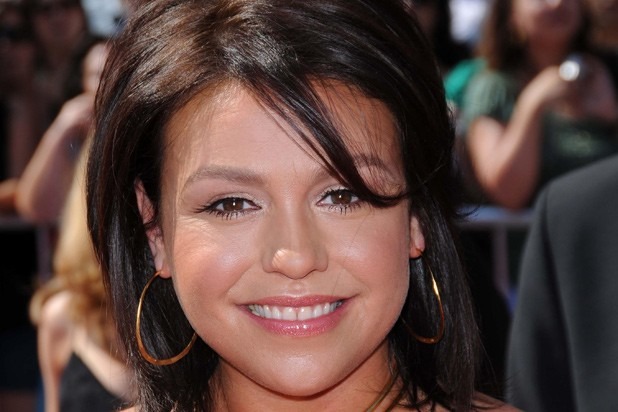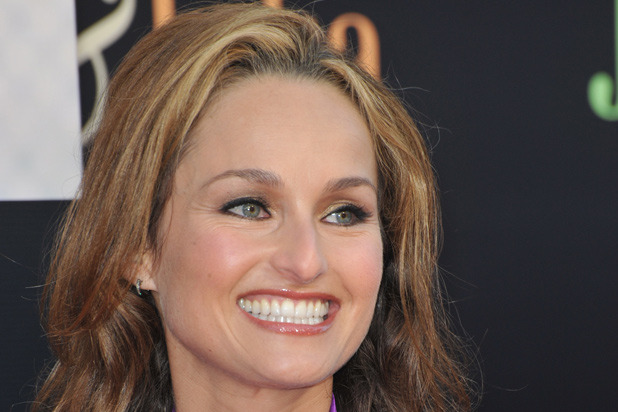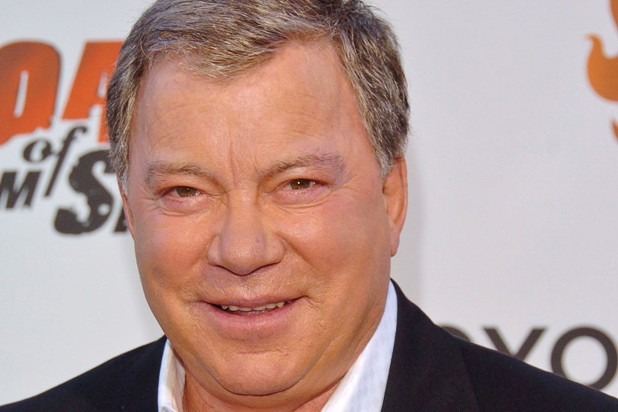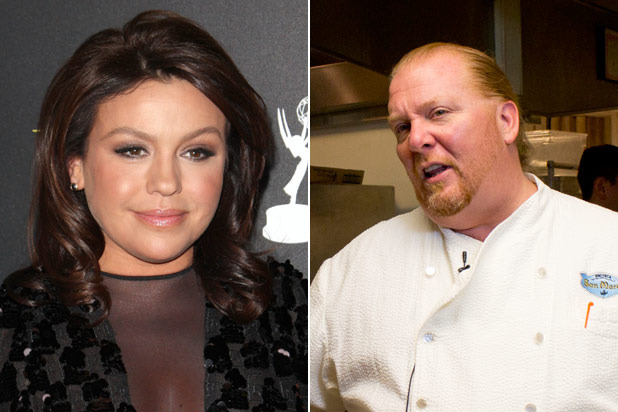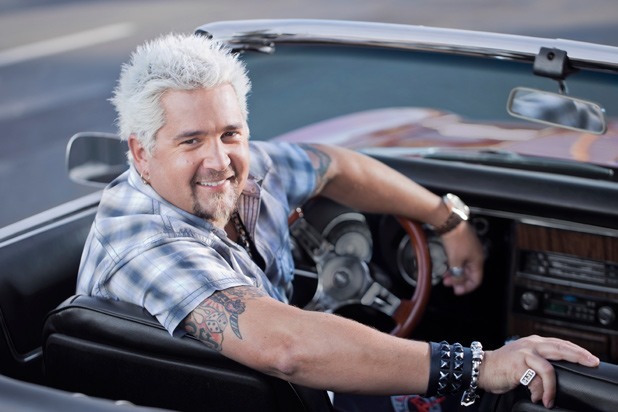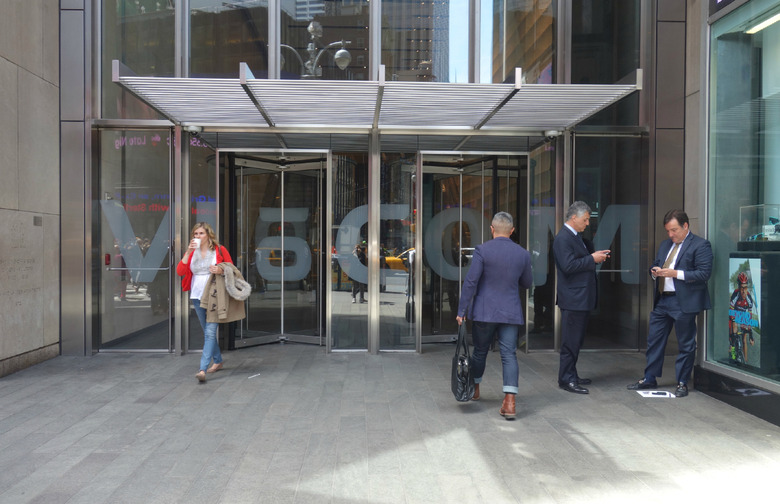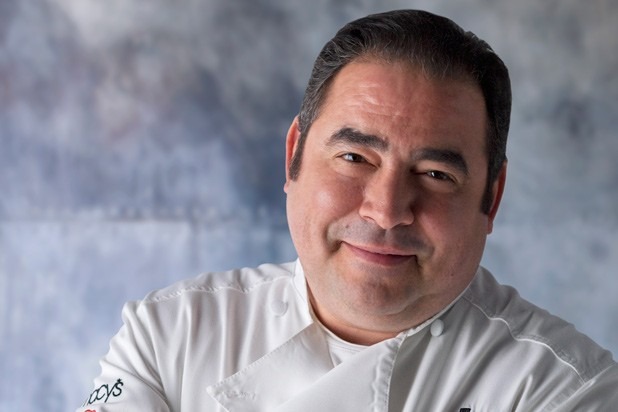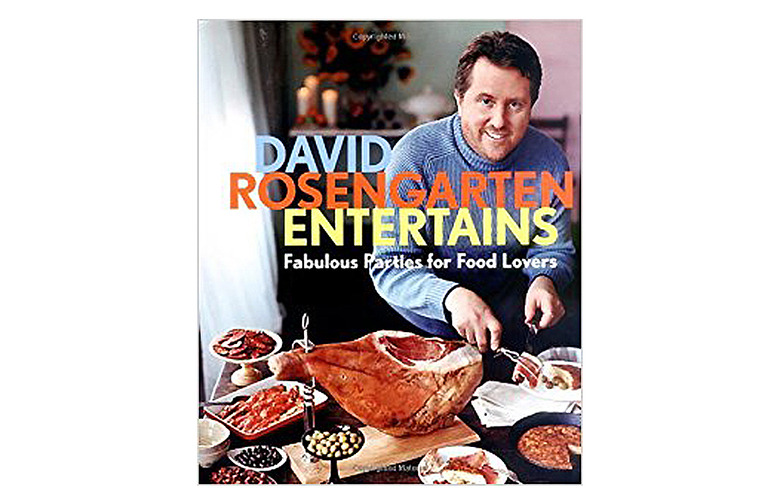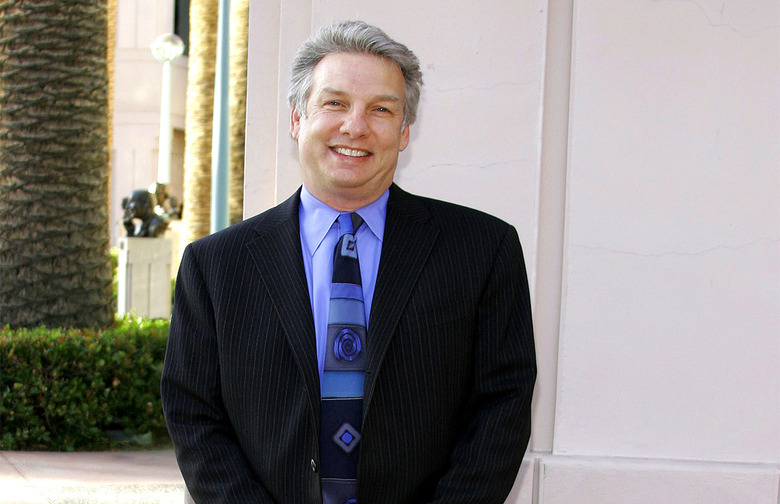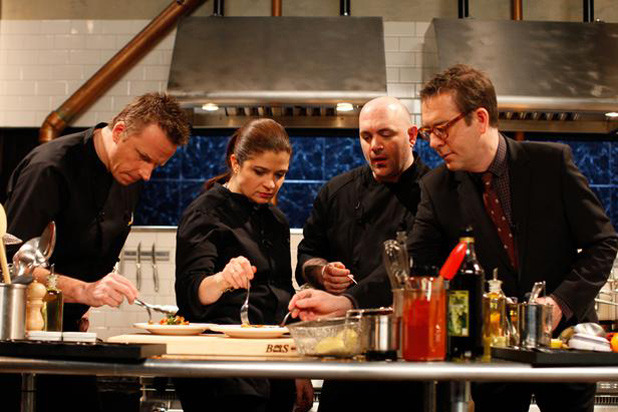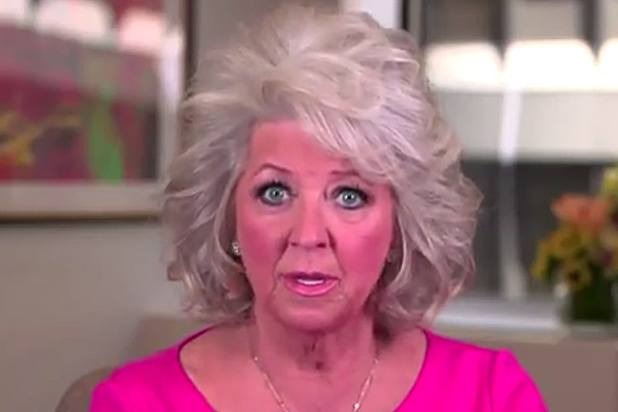20 Surprising Facts About Food Network And Its Stars (Slideshow)
The first set had no oven (and when they finally got one it was so low-quality that the glass would constantly shatter), the smells of the food cooking would permeate the network's entire office, the sinks had no drainage so stagehands would have to be constantly emptying out slop buckets, and when Mario Batali would remove food from the fictional "oven," he had to "simulate the sound of an oven door slamming by stamping his foot on the floor."
2) 'Bam!' was originally intended to wake up a drowsy crew
Much of the early crew worked many jobs to make ends meet (the reason their names didn't appear in credits was because they were paid below normal union rates), and Emeril had to deal with camera operators that were falling asleep as he cooked. "Inspired first by the need to keep the cameramen awake, Emeril started yelling as he added ingredients to dishes — 'Bam!'" And a legend was born.
3) Batali flubbed his first line, then cut himself
"I'm Mario Batali, chef and co-owner of Pó restaurant, an Italian village," was the first sentence the now-legendary chef spoke on-air. Then, in one of the early episodes of his show, Molto Mario, he accidentally grated his knuckles along with some cheese. Bleeding and in pain, and all-too-aware of the network's "no do-over" rule, "he plunged his hand into a bowl of tomatoes" and crushed them until it was time for commercials.
4) They accidentally broadcast porn
Jan. 30, 1997 is a date that will live in Food Network infamy. Why? In the early morning hours, during an airing of Too Hot Tamales, someone sabotaged the tape, and it cut to hardcore, explicit porn, with narration by Milliken no less, for a full minute. Broadcasting porn is a federal offense, so FBI agents showed up at the network the next day and grilled everyone involved with the production. Nobody fessed up, and the network was never punished.
5) Iron Chef’s Chairman Kaga is a crazy character
If you've seen an episode of the original Japanese Iron Chef, you'll know that Chairman Kaga, with his wild outfits and bizarre antics, is a bit of an eccentric. But the actor who portrayed him, Takeshi Kaga, who also played Jean Valjean in the Japanese production of Les Misérables, was also a bit of an oddball. When the production team came to New York to film the first crossover challenge with Bobby Flay as challenger, Kaga, who's apparently a Method actor, stayed in character the entire time that he was in the city. Now that's dedication!
6) Martha Stewart doesn’t come across as particularly friendly
Several people in the book aren't depicted in the best light, but Martha Stewart comes across as nothing short of an ice queen. During the final meeting after negotiating a deal to broadcast cooking segments from her daytime shows, netting her company several million dollars, she "stood facing the opposite direction, alternately looking out a window and poking at her mobile phone," according to the book. "When it came time to sign, she strode to the table, signed the papers, and strode out of the room without... a handshake or even a glance." Later, after Stewart produced a pilot for Ina Garten, she ordered the tapes destroyed because Garten's Fiestaware looked too much like the dinnerware Stewart used on her show, and she was "unhappy that another woman was going to be the star of a show produced by her company." Yikes!
7) Rachael Ray’s first impression of New York was horrific
Rachael Ray moved from upstate New York to the city at age 23, and her first job there was running a candy counter at Macy's while living in Queens. Her next job was at Upper East Side gourmet shop Agata & Valentina. She worked there from 4:45 a.m. until after midnight, running on little to no sleep. One night she was robbed in her building's vestibule at gunpoint, but got away after spraying her attacker with pepper spray. A few days later her foot fell asleep at work, and when she got up she stepped on it wrong and broke her ankle. Then, 10 days later, the attacker came back, "dragged Rachael off her crutches into a dark spot and began beating her with the gun." She moved back home after being released from the hospital, but after nailing a morning show segment with Al Roker she was invited back down to make a pilot for the network, and the rest is history.
8) Giada had to train herself to smile
Giada de Laurentiis was told by her producer to "smile whenever she spoke on camera, no matter what was happening around her," which was easier said than done. Her first 12-hour shoot "made her cheek muscles ripple with pain," but we're pretty sure she's accustomed to it by now.
9) 'Iron Chef' aired on UPN before Food Network, with William Shatner as host
Yes, you read that right. In 2001, Food Network turned down the opportunity to buy the rights to Iron Chef, and it was picked up by UPN, who quickly butchered it. Iron Chef USA starred Shatner as the Chairman, who wore a "glittering purple coat and a frilly vest" and would proclaim dishes to be "totally rad!" It was way too campy, and was canned after two episodes.
10) Bourdain left Food Network because of Ferran Adrià
Anthony Bourdain's first major TV show was A Cook's Tour, where he traveled around the globe sampling cuisine. For season three, Bourdain wanted to take advantage of an opportunity to film elBulli master chef Ferran Adrià at work in his kitchen, but the network was reluctant to send him abroad, as domestic episodes generally fared better. So Bourdain quit, produced Decoding Ferran Adrià by himself, and it became the pilot for a series he sold to the Travel Channel: No Reservations.
11) Mario Batali and Rachael Ray are party animals
After a late-night dinner at Cleveland's Lola with fellow Food Network stars including Rachael Ray and Marc Summers (in which Batali had all the silverware removed so they could eat with only their hands), Batali declared that they were all going to a strip club. After arriving there shortly before 3 a.m., he promptly ordered 25 shots and lap dances for Ray and Summers. At a 9 a.m. demo the next morning, Batali was "hitting his mark, although his voice was unusually deep and gravelly." As for Ray, she "complained repeatedly from the stage about her hangover."
12) Guy Fieri had tried to make it on Food Network before his big win
While Guy Fieri shot to fame after winning season two of The Next Food Network Star, that wasn't his first attempt to make it in primetime. In fact, he was reluctant to even audition after a bad previous experience. "He had auditioned to be on a pilot for a barbecue show in 2004 that went nowhere, so it took some coaxing to get him to try again," according to the book. In his audition tape for The Next Food Network Star, "he used his own nickname, Guido, and demonstrated how to make a sushi roll." The season was no contest, and he won in a landslide.
13) Viacom nearly launched a competitor in 2005
If all had gone to plan for media giants Viacom and Comcast, they would have launched a competing network called Gusto in 2005. The network's goal was to "recapture the more food-centric crowd that Food Netwrok seemed to have abandoned as it chased a broader audience, "according to the book. The plan was to have shows hosted by food critic Jeffery Steingarten and wine expert Josh Wesson, and a dinner-party show with guest including Gabrielle Hamilton, Pete Wells, Drew Nieporent, and Susie Essman. Comcast decided against partnering with Viacom, however, and the idea was killed. The close-call forced Food executive to begin thinking up programming that was "more Whole Foods, less Wal-Mart."
14) Emeril was offered a spot on 'Iron Chef America'
Emeril Lagasse was devastated after his live show, which was the network's highest-rated show for many years, was canceled due to lagging ratings and high production costs. But he wasn't just let go outright: he was offered the opportunity to compete as one of the original Iron Chefs on Iron Chef America, which was in development at the time. Emeril considered the offer to be a major demotion, but the network saw it as an opportunity to recast him as "gritty, electric, and inventive." He turned them down outright.
15) David Rosengarten was asked to audition for 'Food Network Star"
David Rosengarten was host of two of the network's earliest shows and was an integral part of its programming schedule until the end of the '90s. But as an example of just how much the network had changed in just a few years, he was all but forgotten by the mid-2000s. Publisher of the popular culinary newsletter The Rosengarten Report, he received a call from a Food Network staffer who thought he might be interested in auditioning for The Next Food Network Star. He informed her that he already had some history with the network, and two hours later the staffer called back to apologize.
16) Marc Summers warned Robert Irvine about his bio
Summers' company produced Dinner: Impossible for chef Robert Irvine, and Summers noticed that Irvine's official bio looked a little embellished: he claimed to have cooked for George Bush Sr. and Jr. at their inaugural dinners, as well as "royalty, presidents, and high-ranking dignitaries" aboard the Royal Yacht Britannia. On the eve of the show's premiere, Summers told Irvine that he might want to make sure that his bio was accurate, but Irvine brushed him off. The truth came out much later (Irvine had in fact lied), and it nearly cost the muscle-bound British chef his career.
17) There’s a 'shadow kitchen' where chefs cook along with what's on TV
Did you ever wonder what happens if Rachael Ray were to burn a batch of cookies on-air? Well, there's what's called a "shadow kitchen" a stone's throw from the studio, where sous chefs cook along with what's being cooked on-air, in case something gets burned and needs to be swapped out for the cameras without having to re-cook the entire dish.
18) 'Chopped' was originally a really bizarre, wacky show
The original idea for Chopped was a whole lot more nutty than the no-frills show that ended up making it to air. In the original pitch, inspired by Deal or No Deal, a silhouetted tycoon would plan a dinner party, and his butler, "a snooty John Cleese type," would pit four chefs against each other for the privilege of cooking the dinner. After each round a chef would be eliminated by a panel of judges (including Rocco DiSpirito), and their dish would be fed to a Chihuahua named Pico. The crew didn't realize just how passionate the chefs would be about winning the competition, so after the initial idea was rejected by programming head Bob Tuschman, they reformulated the show to focus on the chefs instead of the wacky setup. And Chopped was born.
19) Paula Deen didn’t consult with the network before her diabetes fiasco
In May 2011, the National Enquirer reported that Paula Deen had been suffering from diabetes for years, and soon after Deen's rep was approached by Novo Nordisk about endorsing their diabetes treatment, Victoza. For $6 million, Deen would announce that she had diabetes and that she was taking Victoza, and that some of her healthy recipes could be found on the Novo website. And that's exactly what she did. As bad press piled up, Food Network, who wasn't consulted ahead of time and had a whole season of Deen's chicken-fried show ready to air, was forced to put as positive a spin as possible on it.
20) Deen’s bumbling first apology video was released by accident
Two years later, Deen again found herself the subject of ridicule, as accusations of racism were levied against her by an employee who was suing her. Deen smugly admitted to using the N-word in a deposition, and as her reputation began to take a landslide, her PR team told her to release a video apologizing. Anyone who saw the first video would know that there was something bizarre about it: it was three separate takes, less than a minute long, and oddly generic and repetitive. It almost looked like a practice run, and in fact it was: it was posted to YouTube by accident. Her second, "official" apology video didn't go much better: it was amateurish, with a Diet Coke can, makeup, and paper towels strewn about. Food Network had seen enough, and soon afterward they pulled the plug on Deen.

